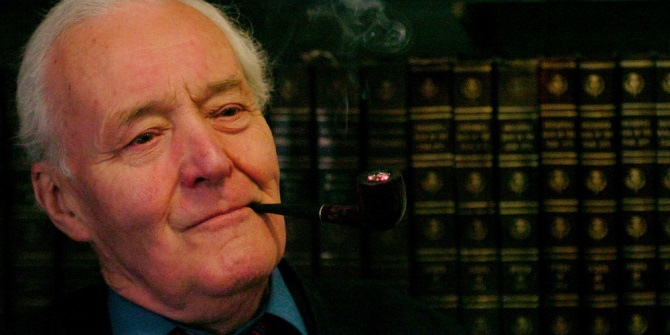We asked our Election Experts to comment on last night’s Leader’s debate on international affairs. This is what they said:
Dr Sara Hagemann – LSE European Institute
A real debate on Europe!
The second round in the UK election debate last night showed great differences in the party leaders’ foreign policy agendas. Not least on Europe, where Nick Clegg and Gordon Brown’s challenge of David Cameron’s more Euro-sceptical views on ‘Brussels’ meant that both sides had to elaborate on what exactly they see as the pros and cons of EU membership. It is not the first time in UK politics that ‘Europe’ is on the table at election time. However, it is hard to recall a debate over real policies – i.e. cooperation on unemployment, crime, climate change, trade, etc – rather than just the question of whether or not Brussels has moved into Westminster and taken over decision-making in core UK policy domains.
What we witnessed last night was exactly that: A few (first?) steps into a more nuanced political debate over why the UK must remain in the EU (contrary to what powerful populist media demand) and how citizens are affected by EU policy decisions in their daily day lives.
Pro-Europeans should not celebrate yet, however. Cameron is a more pragmatic EU-sceptic than much of his party, but his message on how to handle Brussels is a simple one: powers need to be repossessed and a UK Prime Minister must stand up for the country’s interests! The fine prints of these arguments may not project radical changes of the kind that the most conservative of the Tories would wish for, but a large proportion of UK voters are still highly sceptical of ‘Brussels’ and find resonance in Cameron’s points. So although the UK debate on Europe has been greatly nuanced by the emergence of a third party in this election campaign, Labour and the Lib Dem.s still have an awful lot of convincing arguments to present if they are to win over the electorate on the issue of Europe.
Professor Chris Brown – LSE International Relations
The defining one-liner from last week’s debate was Gordon Brown’s repeated ‘I agree with Nick’ – which gave the Liberal Democrats a good slogan for a T-shirt, and symbolised the way in which the other two leaders ganged up on David Cameron. Predictably the debate of Global affairs went rather differently – the battle had three sides on some issues, and on Trident replacement, predictably, it was Brown and Cameron vs. Clegg. In fact, both the leaders of the two main parties gave better performances than last week, and both had clearly decided that they had to take the battle to Nick Clegg, which they did with some success – he looked much less comfortable than before. On MPs expenses Cameron punctured Clegg’s ‘holier-than-thou’ attitude rather effectively, and, more generally, the attempt to suggest that he and his party were not really politicians didn’t seem to wash in the way that it had a week earlier.
Early YouGov polls suggest Cameron ‘won’ overall, with Clegg second; my sense is that is a little unfair to Brown, whose body language and general presentation hasn’t improved but who came through as forceful and commanding – the ‘great clunking fist’ was back. Still, Cameron’s position on Europe and on immigration is in tune with popular sentiment and he presented his case well, and that probably carried the day.
So, in terms of foreign policy, what have we learnt from this debate? That all three parties are committed to British membership of the EU although with varying degrees of enthusiasm, that all three would continue with the Afghanistan Campaign again with varying degrees of enthusiasm, that two of the three are committed to a replacement for Trident, with the third calling for delay and a review (and the delay will probably take place whoever wins) and that all three parties are committed to a special relationship with the US. What is interesting is that opposition to these four positions can be found in all three parties – this is a case where the really interesting debates actually cross party lines, and as a result don’t surface in election campaigns, at least not if the party leaders can help it.
Dr Leandro Carrera – LSE Public Policy Group
I would call this debate “back to basics”: each of the three candidates tried to appeal its most likely voters. Brown, more assertive than last time, highlighted some of the achievements of his government such as tax credits and free bus passes and TV licensing for the elderly. He also pointed out that Clegg was a “risk” for security due to his claim of revising labour’s spending on defense. Cameron definitely tried to show himself as stronger and decisive, a weak aspect of his performance in the last debate. For example, on the point of Europe, he re-asserted the necessity to impose a “British” view on the issues discussed at the EU level. Finally, Clegg made a strong appeal to young voters to register and vote for change. On the immigration issue, I think that he was realistic in pointing out that government cannot pretend to deport the estimated 900,000 illegal workers in the country and that some solution must be found to regularise their situtation. I think he was also realistic (even though Gordon told him to ‘get real’) in telling Brown that you cannot spend money that you may not have in a defense system concieved for the cold war era. Finally, he also pointed out that while government has spent significant amounts in defense, the troops in Afghanistan sometimes do not have the appropiate equipment.
All in all, I think both Brown and Cameron tried to “learn” from the assertiveness of Clegg’s performance last week. I think that to a certain extent they suceeded in doing that. Whether that will help in garnering voters’ support, that’s another story.







